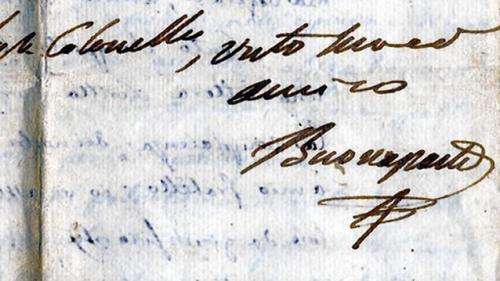Bonaparte family letter to return to France

(Phys.org) —A handwritten letter dated April 27, 1792, signed by Joseph Bonaparte and referring to a skirmish in Corsica involving Napoleon, the writer's then 22-year-old brother, will be returned to its rightful owner, the Republic of France, on Thursday, May 16, at a repatriation ceremony at Northwestern University.
Northwestern University Library will present the rare letter and a collection of 250 documents spanning some 450 years to M. Graham Paul, Consul General of France in Chicago, at the ceremony following a symposium on the restitution of cultural items.
Four years ago, archivist Jason Nargis was astonished to discover the 200-plus year old letter written in Italian and signed "Buonaparte" while cataloging the McBride Collection at Northwestern University Library.
The collection was given to the library in the 1980s by the family of an American named Jack McBride. A magician and dancer in a USO troupe stationed in Corsica, McBride is credited with saving the collection from destruction in the final months of World War II when he stopped soldiers from burning documents.
Northwestern librarian Nargis quickly determined that the surviving collection—probably the archive of a noble Corsican family—represents "a microcosm of noble life." With its letters, imperial pronouncements, military orders, diplomas, police reports, newspapers and other documents, it is of potential interest to historians and biographers.
"Issues and problems of displaced cultural material and ownership are common," says Associate University Librarian Jeffrey Garrett, who will speak at the May 16 symposium. "Although works of art receive the most public attention, all kinds of cultural property are held, but not necessarily owned, by museums and libraries."
Figuring out who owns what can be difficult, and the story behind the repatriation of the Bonaparte letter and the collection it is part of is long, convoluted and involves scholars, bureaucrats, handwriting specialists, lawyers and librarians from around the world.
The collection includes correspondence by prominent figures in Corsican and French history. They include Pascal Paoli, an 18th century Corsican patriot and Bonaparte family ally (and later bitter enemy) who wrote the Corsican Constitution; Louis Napoleon, who reigned as Napoleon III in the mid-1800s; and Prosper Merimee, a well-known dramatist whose novella "Carmen" inspired Bizet's famed opera of the same name.
Outlying documents that appear to have little connection to the rest of the collection are puzzling but also of interest. They include proclamations relating to the appointments of justices to the Oregon Territory, a Nazi newspaper and a handmade swastika made of tissue paper and cardboard.
"The Bonaparte letter casts light on an early episode in the life of Napoleon Bonaparte, and much of the McBride material offers insight into the mores and manners of French and Corsican noble families," Garrett says. "The paper swastika is a sad final footnote to this archive. We don't know who made it or why."
The symposium, "Retour a la France: Restoring Cultural Heritage in the 21st Century," will feature remarks from Northwestern librarians about the rediscovery and identification of letters in the McBride Collection and by Northwestern historian Peter Hayes, Theodore Zev Weiss Holocaust Educational Foundational Professor, on "The U.S. and the Repatriation of Objects Taken in World War II."
Members of the McBride family are expected to be in attendance.
Provided by Northwestern University


















